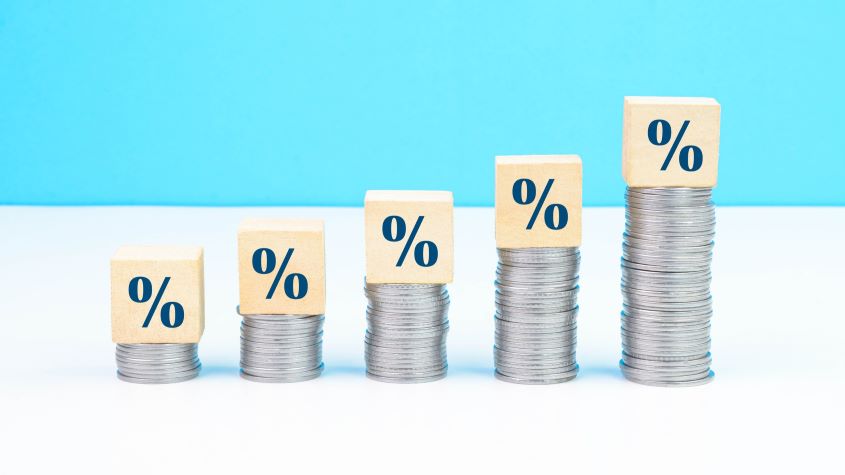How to earn a higher rate on your spare cash in ISAs and SIPPs
Money-market funds can help investors get more interest on balances in Isas and Sipps


Get the latest financial news, insights and expert analysis from our award-winning MoneyWeek team, to help you understand what really matters when it comes to your finances.
You are now subscribed
Your newsletter sign-up was successful
Want to add more newsletters?

Twice daily
MoneyWeek
Get the latest financial news, insights and expert analysis from our award-winning MoneyWeek team, to help you understand what really matters when it comes to your finances.

Four times a week
Look After My Bills
Sign up to our free money-saving newsletter, filled with the latest news and expert advice to help you find the best tips and deals for managing your bills. Start saving today!
The interest rates that brokers pay on cash balances in investment accounts are slowly ticking up – but as usual, they remain well behind the Bank of England’s base rate.
Hargreaves Lansdown, the UK’s largest broker, pays 1% for balances under £10,000 (1.7% in a self-invested personal pension – Sipp), rising to a maximum of 2.3% on balances over £100,000 in a Sipp.
Most other brokers such as AJ Bell and interactive investors are similar. Some are noticeably less generous: Barclays Smart Investor pays no interest on an individual savings account (Isa) or Sipp. Vanguard quietly used to pay base rate minus a small deduction, which amounted to more than you could get in any cash Isa.
MoneyWeek
Subscribe to MoneyWeek today and get your first six magazine issues absolutely FREE

Sign up to Money Morning
Don't miss the latest investment and personal finances news, market analysis, plus money-saving tips with our free twice-daily newsletter
Don't miss the latest investment and personal finances news, market analysis, plus money-saving tips with our free twice-daily newsletter
However, after that got splashed all over various personal finance forums last month, the platform changed its terms and will now pay a fixed rate from later this month, initially set at 2.2%.
All of this is better than the zero that most brokers paid for the last few years (except for a few like Barclays, where clients might be well advised to grumble).
Still, many investors will wonder if there are ways to get a higher return if you’re holding a large amount of cash. And there is – but it is important to be aware that these funds are not the same as cash deposits.
Earn a better return on your ISA and SIPP cash
Cash makes a comeback In most brokerage accounts, you will be able to buy a range of funds with names such as “money market”, “liquidity” or simply “cash”.
These aim to deliver a return in line with a benchmark such as sterling overnight index average (Sonia), the rate at which UK banks and other institutions make overnight loans to each other. The funds do this by holding a variety of debt: bonds that are maturing soon, short-term loans to companies (known as commercial papers), deposits with banks and loans to financial institutions. Some of these debts may be repaid within days, others might have a maturity of a few months.
Details vary, but look at funds from big names – eg, BlackRock, Fidelity, JPMorgan, L&G and Royal London – and typically short-term loans to banks make up a large part of portfolios. That means that as interest rates rise, payouts should do so quickly as well.
For example, see the Vanguard Sterling Short-Term Money Market Fund (just because the website is clear and the 0.12% fee is low). It has 60% of its assets in bank deposits, with 40% having a maturity of less than one week. The weighted average maturity is just under 42 days. So while the fund has returned 1.75% over the past year (against 1.96% for the Sonia benchmark), averaging the last three payouts suggests a current yield of 3.2% and rising.
Short-term interest rates are now high enough that most money-market funds will pay out more than you can get in interest in any brokerage account.
Keep an eye on the costs of investing
However, you will generally pay some kind of dealing fee to your broker for buying and selling the fund. You’ll also typically pay a platform fee for holding it. These costs will vary between brokers, but you need to work out whether you’d make a meaningful gain compared to whatever interest rate your broker pays. The smaller the amount of cash you hold, the less likely you are to earn more.
Capital at risk
The big caveat is that money-market funds are not capital-protected, while cash deposits are almost completely secure (subject to the risks of the bank they are held in failing, and the limits of the Financial Services Compensation Scheme).
If the fund lends to borrowers who default, you could get back less than you invest. UK money-market funds are supposed to be conservative in terms of where they lend, and the risks are generally thought to be very low, but not zero. It is also possible that during times of market volatility, you might not be able to redeem your investment quickly. That said, all UK money-market funds made it through the severe test of March 2020 intact.
More from MoneyWeek:
- Best easy access savings accounts – March 2023
- The best one-year fixed savings accounts - March 2023
- Best savings accounts – March 2023
- NS&I Premium Bond prize fund rate jumps to 3.3%
Get the latest financial news, insights and expert analysis from our award-winning MoneyWeek team, to help you understand what really matters when it comes to your finances.

Cris Sholt Heaton is the contributing editor for MoneyWeek.
He is an investment analyst and writer who has been contributing to MoneyWeek since 2006 and was managing editor of the magazine between 2016 and 2018. He is experienced in covering international investing, believing many investors still focus too much on their home markets and that it pays to take advantage of all the opportunities the world offers.
He often writes about Asian equities, international income and global asset allocation.
-
 Last chance to invest in VCTs? Here's what you need to know
Last chance to invest in VCTs? Here's what you need to knowInvestors have pumped millions more into Venture Capital Trusts (VCTS) so far this tax year, but time is running out to take advantage of tax perks from them.
-
 ISA quiz: How much do you know about the tax wrapper?
ISA quiz: How much do you know about the tax wrapper?Quiz One of the most efficient ways to keep your savings or investments free from tax is by putting them in an Individual Savings Account (ISA). How much do you know about ISAs?
-
 Interactive investor launches managed ISA – is it any good?
Interactive investor launches managed ISA – is it any good?If you want to invest but don’t know where to start, a managed ISA could be a good solution. Here's a first look at interactive investor’s new product and how it compares to others in terms of fees, investment choice and service.
-
 Interactive Investor launches £5.99 a month Sipp - is it any good?
Interactive Investor launches £5.99 a month Sipp - is it any good?The flat-fee platform says it is leading a pension pricing shake-up. But how does it compare to other pensions on the market? We have all the details.
-
 Act now to bag NatWest-owned Ulster Bank's 5.2% easy access savings account
Act now to bag NatWest-owned Ulster Bank's 5.2% easy access savings accountUlster Bank is offering savers the chance to earn 5.2% on their cash savings, but you need to act fast as easy access rates are falling. We have all the details
-
 Moneybox raises market-leading cash ISA to 5%
Moneybox raises market-leading cash ISA to 5%Savings and investing app MoneyBox has boosted the rate on its cash ISA again, hiking it from 4.75% to 5% making it one of top rates. We have all the details.
-
 October NS&I Premium Bonds winners - check now to see what you won
October NS&I Premium Bonds winners - check now to see what you wonNS&I Premium Bonds holders can check now to see if they have won a prize this month. We explain how to check your premium bonds
-
 The best packaged bank accounts
The best packaged bank accountsAdvice Packaged bank accounts can offer great value with useful additional perks – but get it wrong and you could be out of pocket
-
 Bank of Baroda closes doors to UK retail banking
Bank of Baroda closes doors to UK retail bankingAfter almost 70 years of operating in the UK, one of India’s largest bank is shutting up shop in the UK retail banking market. We explain everything you need to know if you have savings or a current account with Bank of Baroda
-
 How to earn cashback on spending
How to earn cashback on spendingFrom credit cards and current accounts to cashback websites, there are plenty of ways to earn cashback on the money you spend